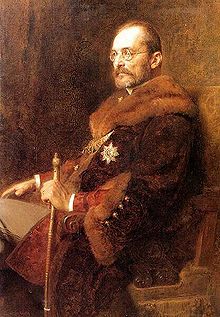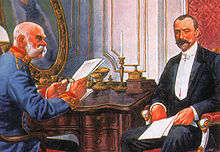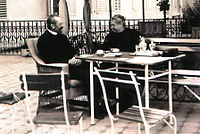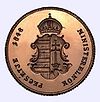- István Tisza
-
István Tisza 
Prime Minister of the Kingdom of Hungary In office
3 November 1903 – 18 June 1905
(1 year, 227 days)Preceded by Károly Khuen-Héderváry Succeeded by Géza Fejérváry In office
10 June 1913 – 15 June 1917
(4 years, 5 days)Preceded by László Lukács Succeeded by Móric Esterházy Personal details Born 22 April 1861
Pest, HungaryDied 31 October 1918 (aged 57)
Budapest, HungaryNationality Hungarian The native form of this personal name is borosjenői és szegedi gróf Tisza István. This article uses the Western name order.Count István Tisza de Borosjenő et Szeged (22 April 1861 in Pest – 31 October 1918, Budapest) was a Hungarian politician, prime minister, and member of Hungarian Academy of Sciences. The two most important events in his life were Austria-Hungary's entry into the First World War when he was prime minister for the second time, and his assassination during the Chrysanthemum Revolution on 31 October 1918. Tisza supported the dual monarchy of Austria-Hungary and was representative of the then liberal-conservative consent.
He had been a Member of Parliament since 1887 and had had abundant opportunities to see how the unyielding temper of the Emperor on the one hand, and the revolutionary spirit of the extremists on the other, were leading to a complete impasse. He himself supported the Compromise of 1867. Tisza opposed any reforms that allowed universal suffrage (before 1918 only 10% of the Hungarian population could vote and hold office). In economic affairs, Tisza was a modernizer who encouraged and supported industrialization. In particular, Tisza was an opponent of anti-Semitism, which he feared could jeopardize Hungary's economic development.
Tisza's role model was Otto von Bismarck.
Early life
István Tisza was the son of Count Kálmán Tisza de Borosjenő, prime minister of Hungary between 1875–1890 from the Liberal Party. His mother was Ilona Degenfeld-Schomburg. The Tiszas were originally a Calvinist untitled nobility (regarded as equivalent to the British gentry). Tisza took legal studies in Berlin, Heidelberg, Budapest, and received a doctorate at Oxford in political science. He then took care of the family land at Bihar and Geszt for five years. He got his electorial mandate in 1886 with the Liberal Party. He received the title of Count in 1897. He was the president of the Hungarian Industrial and Commercial Bank (Magyar Ipar- és Kereskedelmi Bank) and was a member of the boards of numerous joint-stock companies.
Prime minister for first time, 1903–1905
In this period he managed to get the remains of Francis II Rákóczi repatriated from Turkey and interred in the cathedral of Kassa, today Košice. The Parliament approved the increase of conscriptees. As the minister of Internal Affairs he aggressively silenced the railway workers strike in 1904. The organisers were arrested and the strikers were recruited into the army. The police crushed a Socialist gathering for peasants in Bihar, leaving 33 dead and several hundred wounded.
"Election by handkerchief" and electorial defeat, 1905
He passed a modification to the rules of the House of Parliament on 18 November 1904 to crush the obstruction of the opposition. Dezső Perczel, the President of the House, called for immediate voting on the modification. It is not clear what exactly happened, but some sources say that the Speaker of the House of Parliament waved a handkerchief, signalling for the governing party to vote "yes"; this act later became known as the "election by handkerchief", which became a large scandal and, as a consequence, Kálmán Széll and Gyula Andrássy left the Liberal Party and the opposition unified into the "Federal Opposition". The political powers polarised and in new elections the 30 years of governing by the Liberal Party was ended, with the side effect that the party was dissolved.
National Party of Work, electoral victory
After that defeat Tisza only took part in the operations of the House of Parlament, staying away from political struggles. However, the governing Independence Party was unable to withhold positions to protect the interests of Hungary so it resigned on 25 April 1909. On 19 February 1910, Tisza established the National Party of Work (Nemzeti Munkapárt) which subsequently won the election of 1910. He did not desire to form a government, primarily due to his conflict with Franz Ferdinand who sought to centralise the Habsburg Empire with universal suffrage. Tisza opposed this initiative, as he believed that this would lead to the weakening of the Hungarian supremacy over ethnic minorities in Hungary. In addition, he claimed "demagogues would manipulate peasants with the majority of the votes to put in power such groups whose aims are against democracy, supported by the urban intellectuals"[1] (i.e. Communists). Tisza was supported by Franz Josef, but he feared a repeat of the faults of his first prime ministry and thus called for Károly Khuen-Héderváry to form the new government.
Act of Protection
As Speaker of the House of Representatives from 22 May 1912 to 12 June 1913 Tisza supported the reform of the common Austro-Hungarian army to enhance the military power of the dual monarchy. The Hungarian side was fighting for more Hungarian interests (i.e. use of the Hungarian language in the army). The Socialists strongly opposed his acts and organised a rebellion on 22 May 1912 (Blood-Red Thursday), calling for Tisza to resign as President of the House and calling for universal suffrage.
Tisza tried to solve the question of ethnic minorities based on a clerical approach.
He was convinced that the challenging foreign situation called for military preparation and he strongly pushed against opposition obstruction. He did not allow the opposition to speak up regarding rules of House of Parliament. Referring to an act of 1848, he called for the police force to force out numerous opposition representatives. He managed to pass the Act of Protection, resulting in the removal of some members of the opposition party.
As a result, Gyula Kovács, an opposition party representative, tried to assassinate Tisza in the Parliament Building on 7 June 1912. His shots missed and the marks are still visible in the Hungarian Parliament Building to this day. With his last shot Mr Kovacs shot himself, but he survived. Tisza then continued the session.
Second ministry
Tisza became prime minister again on 7 June 1913. During this period of international insecurity, he wanted to solidify the government. He limited the rights of association and passed a law limiting freedom of speech.
A few days before the assassination of Franz Ferdinand in Sarajevo, which resulted in World War I, Tisza supported a strong stand against Serbia. However, after the assassination he was against going to war against Serbia, the only one opposing this in Austria-Hungary. He knew the army's strength, and he was afraid that with the increase of more Slavic territories the equilibrium inside the monarchy would be upset. Moreover, he was afraid that the Little Entente would attack Transylvania.[2] The loss of the alliance with the German Empire would have meant the end of Austria-Hungary as a Great Power, so he gave in and supported the war. He then became a relentless supporter of the war until its end.
Tisza believed Romania to be an enemy from the beginning. He was afraid that if Romania attacked Hungary then the Romanians in Transylvania would revolt against Hungary. In the end, 40,000 soldiers were moved to protect Transylvania.
During the war, the reformists became more and more powerful, but he continued to oppose them. He opposed even the ideas of the new king, Karl I, and so he resigned on 23 May 1917. However, he retained great political influence, and was able to delay the enactment of universal suffrage.
Towards the end of the war, he wanted to convince the Serbs and Bosnians to achieve autonomy within Austria-Hungary. As a homo regius (“king's man”), he went to Sarajevo to attempt this, but without success.
His judgement from abroad during and after the war
It is clear that after the outbreak of World War I, all opposing sides pointed to the other side as the party guilty of initiating the greater war. Interestingly, the British newspaper “New Europe” printed a comment that Hungary was the only responsible party for the war, “where Hungary′s responsibility is greater than Austria′s” and that Tisza was the militaristic politician who dragged all sides into war. As a consequence the “Little Entente” took this view and pushed to punish Hungary at the end of the war. Later, the propaganda of these nations augmented and even invented Tisza's guilt, claiming that he took pains to point out in a report of 8 July that "there should at any rate be no question of the annihilation or annexation of Serbia, and that if Serbia gave way, Austria-Hungary must be content." According to recent findings these accusations are without merit.
The accusations are rooted in the common belief that Tisza carried out a policy of forced Magyarization towards the ethnic minorities in Hungary.
His view on the war
On the day of the assassination of Franz Ferdinand Tisza immediately traveled to Vienna, where he met Minister of Foreign Affairs Count Berchtold, and Army Commander Conrad von Hötzendorf. They proposed to solve the dispute with arms, attacking Serbia. Tisza proposed to give the government of Serbia time to take a stand as to whether it was involved in the organisation of the murder, and proposed a peaceful resolution, arguing that the international situation would settle soon. Returning to Budapest, he wrote to Franz Joseph saying he would not take any responsibility for the armed conflict, because there was no proof that Serbia had plotted the assassination, and he felt the threat of Romania and Bulgaria after the Balkan wars and was afraid of Romanian attack from the east. He was also not sure about the stand of the Germans. Germany's stand was of ultimate importance due to the security of the state.
During a conversation between Franz Joseph and Conrad von Hötzendorf, Conrad asked, "If Germany's reply is that they are on our side, do we engage in war with Serbia?" The emperor replied, "Then yes", "But what if they reply differently?", "Then the Monarchy will be alone".
Kaiser Wilhelm II supported the war, and promised to neutralise a Romanian attack, and put pressure on Sofia. After this, Tisza still sought a peaceful solution, but most of all he wanted to wait for the result of the official examination into the assassination. The only proposal of Tisza, which was accepted, was that the Monarchy should not annihilate Serbia completely, to avoid Russian support for Serbia. The council finally addressed an ultimatum to the Serbian government, and immediately started the mobilisation of troops.
After sending the ultimatum, his view changed. The ultimatum was obsolete within 48 hours, so Tisza wrote: "it was a difficult decision to take a stand to propose war, but now I am firmly convinced of its necessity"[3] He was, however, still opposed to the annexation of Serbia to the Monarchy, but failed. On 4 August 1914 Russia, Germany, Britain and France also entered the war, enlarging it to a world war.
Tisza did not resign from the Prime Ministry, as he thought this was the best way he could represent Hungarian interests inside Austria-Hungary, as he had connections in Vienna. Moreover, his resignation would have sent a message of weakness to the Entente at the outbreak of war.
His opposition of went to public only after the end of war, on 17 October 1918, when he spoke in the Parliament. From this speech, the only thing which was remembered is when he said "We (Hungarians) have lost this war!". He said, "the Monarchy and the Hungarian nation was longing for peace all the way until there were some series of proofs found which we found that the enemy was systematically trying to humiliate and destroy us as soon as possible (...) As we have found proofs that the Serbian government took part in organising the assassination, we could not do but to address an ultimatum to Serbia (...) where we fixed that the war is preventive."
Assassination attempts against him
For many, he was the representative of the war policy in the Monarchy, so he was an assassination target. The fourth assassination attempt against him was successful.
The first attempt was made by Gyula Kovács, opposition politician.
The second was made by a soldier when Tisza was returning from the front line during the war. The bullet missed him.
The third attempt came on 16 October 1918 when János Lékai, a member of the society Galilei-circle and an anti-military group led by Ottó Korvin, tried to kill Tisza while he was leaving the Hungarian Parliament, but the revolver malfunctioned and Tisza managed to flee.[4] The assassin was sent to prison but was released after 15 days during the Chrysanthemum Revolution.
The fourth and successful attempt came on 31 October 1918, when soldiers broke into his home, the Roheim villa in Budapest (Hermina út 35.) in front of his wife. Mihály Károlyi's government initiated an investigation but the killers were not found. However, the family members identified the killers in the trials. In the trial that followed the fall of the Communist regime and ended on 6 October 1921, Judge István Gadó established the guilt of Pál Kéri (exchanged with the Soviet Union), József Pogány (aka John Pepper), fled to Vienna, then Moscow and the USA; István Dobó; Tivadar Horváth Sanovics (fled); Sándor Hüttner (died in prison hospital in 1923); Tibor Sztanykovszky (the only one who actually served his 18-year sentence, being released in 1938).
References
- ^ A magyar jobboldali hagyomány (Hungarian Right-Wing Heritage, 1900–1948. Edited by Ignác Romcsics, Osiris, 2009. pp. 65.
- ^ Köpeczy-Makkai-Mócsy-Szász: History of Transylvania
- ^ Tschirschky's report to the German Ministry of Foreign Affairs, 14 July 1914
- ^ András Siklós. Revolution in Hungary and the Dissolution of the Multinational State. 1918. Studia Historica. Vol. 189. Academiae Scientiarum Hungaricae. Budapest, 1988; p.32-33
- Deak, Istvan "The Decline and Fall of Habsburg Hungary, 1914–18" pages 10–30 from Hungary in Revolution edited by Ivan Volgyes Lincoln: University of Nebraska Press, 1971.
- Menczer, Bela "Bela Kun and the Hungarian Revolution of 1919" pages 299–309 from History Today Volume XIX, Issue #5, May 1969, History Today Inc: London.
- Vermes, Gabor "The October Revolution In Hungary" pages 31–60 from Hungary in Revolution edited by Ivan Volgyes Lincoln: University of Nebraska Press, 1971.
Political offices Preceded by
Károly Khuen-HéderváryPrime Minister of Hungary
1903–1905Succeeded by
Géza FejérváryMinister of the Interior
1903–1905Succeeded by
József KristóffyMinister besides the King
1903–1904Succeeded by
Károly Khuen-HéderváryPreceded by
László LukácsPrime Minister of Hungary
1913–1917Succeeded by
Móric EsterházyPreceded by
Gejza JosipovićMinister of Croatian Affairs
Acting
1913Succeeded by
Teodor PejačevićPreceded by
Teodor PejačevićMinister of Croatian Affairs
Acting
1914–1916Succeeded by
Imre HideghéthyPreceded by
István BuriánMinister besides the King
Acting
1915Succeeded by
Ervin RosznerPrime Ministers of Hungary since 1848 Revolution of 1848 Kingdom of Hungary Transition period M. Károlyi · Berinkey · Garbai · Peidl (opposed by G. Károlyi · Pattantyús-Ábrahám) · Friedrich · HuszárRegency Transition period Communist Hungary Republic of Hungary Italics indicates interim holderMinisters of the Interior of Hungary since 1848 Revolution of 1848 Kingdom of Hungary Transition period Regency Simonyi-Semadam · Dömötör · Ferdinandy · Tomcsányi · Ráday · Klebelsberg · Rakovszky · Scitovszky · Keresztes-Fischer · Kozma · Darányi · J. Széll · Keresztes-Fischer · Jaross · Bonczos · SchellTransition period Communist Hungary Republic of Hungary Ministers of Foreign Affairs of Hungary since 1848 Revolution of 1848 Esterházy · K. BatthyányKingdom of Hungary Festetics · Wenckheim · K. Tisza · Orczy · Szőgyény-Marich · Fejérváry · L. Tisza · Andrássy · Fejérváry · Jósika · D. Bánffy · M. Széchényi · Széll · G. Széchényi · Khuen-Héderváry · I. Tisza · Khuen-Héderváry · Fejérváry · Zichy · Khuen-Héderváry · Lukács · Burián · I. Tisza · Roszner · T. Batthyány · ZichyTransition period T. Batthyány · M. Károlyi · Berinkey · Harrer · Kun · Pogány · Kun · Ágoston · Tánczos · Lovászy · SomssichRegency Transition period Communist Hungary Republic of Hungary Ministers of Croatian Affairs of Hungary (1868-1919) Kingdom of Hungary Bedeković · P. Pejačević · Bedeković · E. Josipović · Cseh · Tomašić · Cseh · Kovačević · Wekerle · G. Josipović · Khuen-Héderváry · G. Josipović · Tisza · T. Pejačević · Tisza · Hideghéthy · Zichy · Unkelhäusser · KunfiCategories:- 1861 births
- 1918 deaths
- People from Budapest
- Prime Ministers of Hungary
- Tisza family
- Calvinist politicians
- Hungarian Interior Ministers
- Foreign ministers of Hungary
- Ministers of Croatian Affairs of Hungary
- Knights Grand Cross of the Order of Saint Stephen of Hungary
Wikimedia Foundation. 2010.



